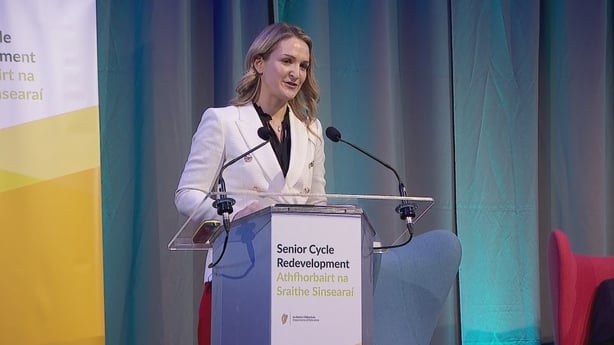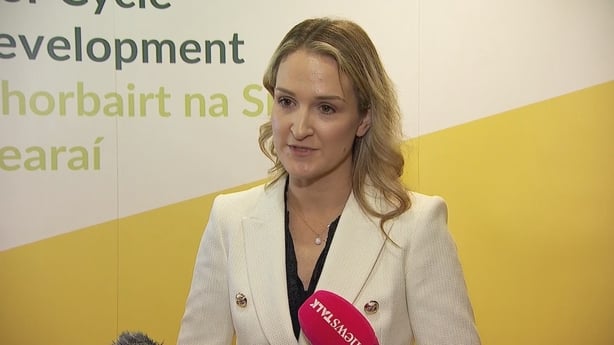Within minutes of arriving at a conference on Senior Cycle reconfiguration at Croke Park on Wednesday, new Minister for Education Helen McEntee had scotched any stray hope that she might adopt a gentler or slower approach to the plans for Leaving Certificate reform which will see a significant shift away from exams in favour of practical assessments.
There is very significant concern among teachers, but asked about appeals by their trade unions that the process be slowed down Helen McEntee was clear; there will be no delay.
Addressing worries that teachers have about the potential impact of generative AI, about how to ensure academic integrity, and the need for guidelines and training for teachers Minister McEntee said, "there is still time".

She was referring to between now and September when the first changes are due to come into force.
The conference was for principals and deputy principals. Several hundred were in attendance. As school leaders they are crucial to the success of any changes.
The principals and deputy principals attended talks delivered by senior Department of Education officials and State Examinations Commission staff.
It is always worth paying attention to what these people say to school leaders.
In this gathering of people mostly in favour of the reforms, the strong focus was on the questions of academic integrity and fairness, and no one was downplaying the challenge.
Reputation at stake
The reputation of the Leaving Certificate, and of schools, is at stake, attendees were told.
The new forms of assessment must be "valid, reliable, fair, equitable, and inclusive".
Protecting academic integrity "is a challenge for us all", attendees were also told.
The reconfiguration will mean a shift in every subject away from final written exams and towards practical assessment components.
In every subject at least 40% of final Leaving Certificate marks will be awarded for these projects, which will be completed during the school year.
The science subjects of Physics, Biology and Chemistry are among the first to be revamped, with new curriculums coming in this September for incoming fifth year students.
Students will be required to complete a project involving original research and experimentation which they will then write up.
Most in education, including the two second level teacher trade unions, agree with the concept of introducing more practical assessment components for students.
But how does the system ensure that a student's project is actually their own work? What is to stop a student from cheating? What about the threat posed by AI?
While assessment projects will be marked by the State Examinations Commission, it is teachers and school principals who will police the new system.
In the main, projects must be completed in school under the supervision of the subject teacher and must be authenticated by them and by the school principal, the conference was told.
The school and the teacher will be required to stand over a student’s work, and they need to be satisfied that the student has carried out the work themselves.
Work that is not authenticated by the subject teacher or school will not be accepted.
Guidelines for the Additional Assessment Components (AACs) were quoted: "The submission of work by any student not entirely completed by that student is a significant breach of regulations".
'Teachers need training in AI'
The principals in attendance at Croke Park seemed largely in favour of the reforms, at least all who spoke to RTÉ News were.
"I sat my Leaving Cert over 30 years ago and we can’t expect children today to be sitting the same exams", said Regina Anderson, Principal of St Louis Community School in Kiltimagh, Co Mayo.
"It is badly needed and the time is right", said Audrey Carty of Mount Carmel Secondary School in Co Dublin.
But these school principals and others also express some level of concern or worry. Articulating what is the most common concern, Ms Anderson said "teachers need training in AI".
Audrey Carty, the principal of a DEIS school said: "We have a lot of concerns about AI, about how this is policed.

"Our students do not have access to the same IT as others. I’m hoping they won’t be disadvantaged by others maybe taking unfair advantage."
Few will argue that the senior cycle as it is currently constituted is completely fair, but there is a level of integrity in the simple fact of every student sitting down in front of a blank page in an exam hall and answering questions.
The concern - at its most basic - is that canny students (or their parents) will be able to get generative AI to do their project work for them.
Officials from the Department and the State Examinations Commission attempted to address the threat that AI poses. Guidelines are being drawn up and are coming, they said.
Students must reference and acknowledge all research sources. The use of AI in this way is plagiarism and would be treated as such.
Evolution
Acknowledging that this is an evolving area, they referred to fundamental principals that would not change - a student’s work has to be authentic and teachers have to be satisfied that students have carried it out themselves.
No speaker was downplaying the challenge presented by AI but one reminded those listening of the threat Wikipedia had posed in the 2000s, that came from Google in the late 90s, the internet before that, and before that again with "the Encyclopaedia Britannica".
That speaker also referenced family members who may be experts in a topic and who may complete work for a student.
(This reminded me of an acquaintance who, years after the event, is still sore about the 2.1 his daughter at university received for the essay that he wrote and which - he remains convinced - merited a 1.1.)
"The main message coming out is the idea of students understanding that the work needs to be their own", Principal at Lucan Community College Diane Birnie told RTÉ News, "of giving students agency, and making sure that staff are very aware from the start what is expected of them".

Ms Birnie feels the shift towards more practical assessment may not be such a big change.
"It is and it isn’t. We have around 29 subjects already that use some element of practical assessment so many of our schools are already doing this day in day out."
"It is a big change for some of our core subjects that have never had that element but there is an awful lot of good practice happening in our schools at the moment and we need to focus on that and see that good practice shared."
But others are more nervous.
"AI is worrying teachers" said Michael Gillespie General Secretary of the Teachers Union of Ireland.
"We are rushing it. We don’t believe it is properly resourced. We are very worried that AI will give advantage to advantage and will disadvantage disadvantage".
"We are going through a digital revolution and of course this can be challenging", Minister McEntee said to questions about AI and the integrity of the Leaving Certificate.
Promising to work with teachers and ensure that training was "adequate" she said: "It is about equipping ourselves into the future. We have to be able to adapt and respond."
At Croke Park on Wednesday school principals agreed with that broad sentiment, but there is a palpable nervousness. Say what you like about our current Leaving Certificate, but it is regarded as incorruptible, and it does have significant respect both at home and abroad. That reputation is precious.
Will the new reformed senior cycle and Leaving Certificate be fairer and better? "I hope so!" said one principal, "but the stakes are very high".







